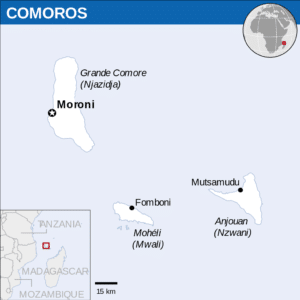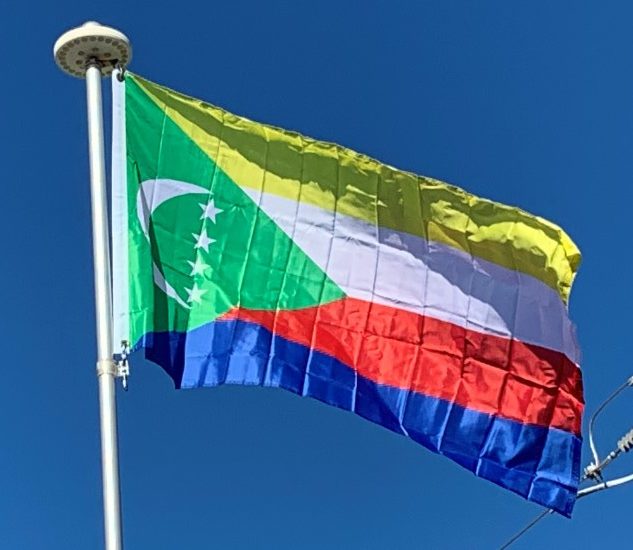In contrast to Soilih, Abdallah’s presidency was marked by authoritarian rule and increased adherence to traditional Islam and the country was renamed the Federal Islamic Republic of the Comoros (République Fédérale Islamique des Comores; جمهورية القمر الإتحادية الإسلامية). Abdallah continued as president until 1989 when, fearing a probable coup d’état, he signed a decree ordering the Presidential Guard, led by Bob Denard, to disarm the armed forces. Shortly after the signing of the decree, Abdallah was allegedly shot dead in his office by a disgruntled military officer, though later sources claim an antitank missile was launched into his bedroom and killed him. Although Denard was also injured, it is suspected that Abdallah’s killer was a soldier under his command.
A few days later, Bob Denard was evacuated to South Africa by French paratroopers. Said Mohamed Djohar, Soilih’s older half-brother, then became president, and served until September 1995, when Bob Denard returned and attempted another coup. This time France intervened with paratroopers and forced Denard to surrender. The French removed Djohar to Reunion, and the Paris-backed Mohamed Taki Abdoulkarim became president by election. He led the country from 1996, during a time of labour crises, government suppression, and secessionist conflicts, until his death November 1998. He was succeeded by Interim President Tadjidine Ben Said Massounde.
The islands of Anjouan and Mohéli declared their independence from the Comoros in 1997, in an attempt to restore French rule. But France rejected their request, leading to bloody confrontations between federal troops and rebels. In April 1999, Colonel Azali Assoumani, Army Chief of Staff, seized power in a bloodless coup, overthrowing the Interim President Massounde, citing weak leadership in the face of the crisis. This was the Comoros’ 18th coup, or attempted coup d’état since independence in 1975.
Azali failed to consolidate power and reestablish control over the islands, which was the subject of international criticism. The African Union, under the auspices of President Thabo Mbeki of South Africa, imposed sanctions on Anjouan to help broker negotiations and effect reconciliation. The official name of the country was changed to the Union of the Comoros and a new system of political autonomy was instituted for each island, plus a union government for the three islands was added.

Azali stepped down in 2002 to run in the democratic election of the President of the Comoros, which he won. Under ongoing international pressure, as a military ruler who had originally come to power by force, and was not always democratic while in office, Azali led the Comoros through constitutional changes that enabled new elections. A Loi des compétences law was passed in early 2005 that defines the responsibilities of each governmental body, and is in the process of implementation. The elections in 2006 were won by Ahmed Abdallah Mohamed Sambi, a Sunni Muslim cleric nicknamed the “Ayatollah” for his time spent studying Islam in Iran. Azali honoured the election results, thus allowing the first peaceful and democratic exchange of power for the archipelago.
